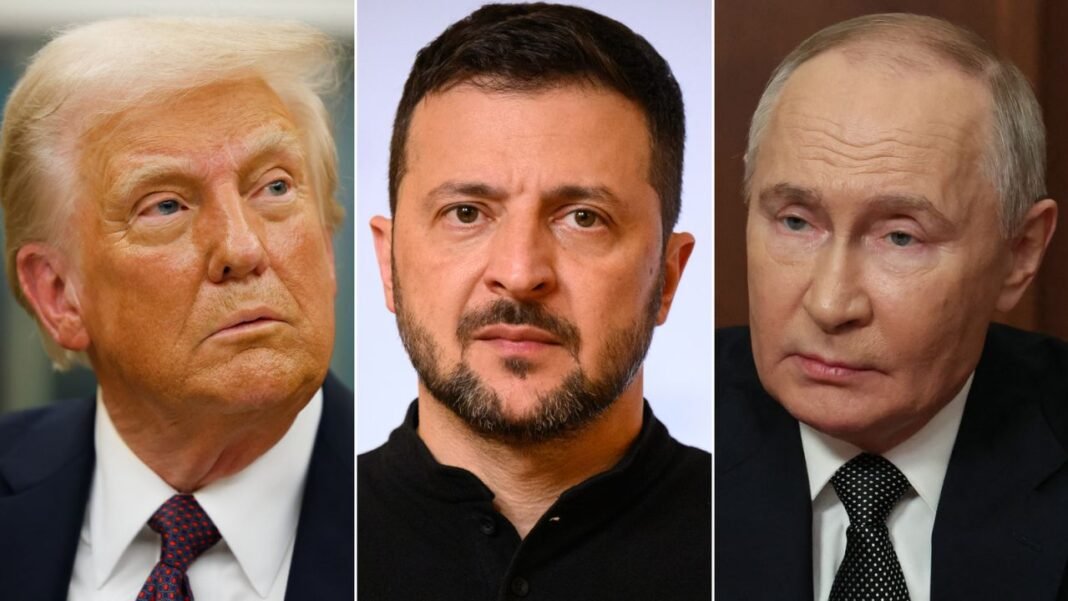With less than 24 hours until a landmark U.S.-Russia summit aimed at ending the war in Ukraine, President Volodymyr Zelensky made an urgent visit to London on Thursday to reinforce European unity and prevent any peace agreement that would result in the loss of Ukrainian territory.
The meeting between U.S. President Donald Trump and Russian President Vladimir Putin, set for Friday in Anchorage, Alaska, comes during one of the most difficult phases of the nearly three-year-old conflict, the largest war in Europe since World War II. Tens of thousands have been killed and millions displaced since Russia’s full-scale invasion in February 2022.
Facing battlefield setbacks against advancing Russian forces, Zelensky is pushing to ensure that any U.S.-brokered settlement does not leave Ukraine exposed to future aggression. The Ukrainian leader’s primary concern is that Trump and Putin might strike a deal such as a territorial compromise that would lock in Moscow’s current territorial gains and undermine Kyiv’s sovereignty.
Zelensky met with British Prime Minister Keir Starmer at Downing Street, building on momentum from a virtual conference on Wednesday with European leaders and Trump. That meeting aimed to establish clear “red lines” before the Alaska talks, which will mark the first direct U.S.-Russia summit on Ukraine in months.
Arriving in London, Zelensky and Starmer exchanged a warm embrace before heading into closed-door discussions. “Yesterday was a pivotal moment for reinforcing European and transatlantic unity,” Ukrainian Foreign Minister Andrii Sybiha wrote on X. “We need peace through strength as a foundation for the future of global security and stability.”
Zelensky revealed he had cautioned Trump that Putin was “bluffing” about his willingness to end the war. He also noted that Trump had expressed openness to including security guarantees for Ukraine in any post-war settlement, though reportedly with conditions attached. Politico cited sources familiar with the discussions who said Trump signaled the U.S. could play a role in those guarantees.
On Wednesday, Trump issued a public warning to Putin, threatening “severe consequences” if the Russian leader refused to reach a peace agreement. While Trump stopped short of detailing those consequences, he hinted at the possibility of expanded economic sanctions should the talks fail. He characterized the Alaska summit as “setting the table” for a follow-up meeting that would include Zelensky.
Despite this rhetoric, concerns remain in Kyiv and across Europe that Trump could be amenable to a “land swap” a deal that would effectively formalize Russian control over roughly 20% of Ukrainian territory. Such an arrangement would be viewed in Ukraine as a dangerous precedent, rewarding nearly 11 years of Russian efforts to seize Ukrainian land and potentially encouraging further expansion westward into Europe.
This week, Zelensky confirmed Russian advances of approximately 9–10 kilometers near Dobro Illia in the Donetsk region. The Ukrainian military, facing personnel shortages, has been forced to deploy reserve units to stabilize the front lines.
Putin’s negotiating position has not changed significantly since June 2024, when he reiterated demands that Ukraine withdraw from four partially occupied regions Donetsk, Luhansk, Kherson, and Zaporizhzhia and renounce its bid for NATO membership. Kyiv has rejected these conditions outright, describing them as tantamount to surrender.
Trump’s agreement to the Alaska summit last week marked an abrupt shift in tone after weeks of voicing frustration with Putin for stalling on U.S.-led peace initiatives. Behind the scenes, figures like Kirill Dmitriev, head of Russia’s RDIF sovereign wealth fund, have maintained contacts with Steve Witkoff, Trump’s special envoy, fueling speculation about possible U.S.-Russia business cooperation in a post-war scenario.
Meanwhile public opinion in Ukraine reflects the complexities of the situation. A Gallup poll released last week found that 69% of Ukrainians favor a negotiated end to the war as soon as possible. However, the same polling shows a majority unwilling to accept “peace at any cost” if it involves significant territorial concessions.
The Alaska talks will be watched closely across global capitals. For Zelensky and his European allies, the priority is ensuring that Ukraine’s sovereignty and security are not sacrificed for the sake of expediency. For Trump, the summit represents an opportunity to claim progress on one of the most intractable geopolitical crises of the 21st century. For Putin, it is a chance to press for terms that would solidify Russia’s territorial gains and weaken Ukraine’s Western alliances.
Whether the Anchorage summit will move the parties closer to ending the bloodshed or deepen divisions over what peace should look like will become clear soon enough. For now, the stakes could hardly be higher.


